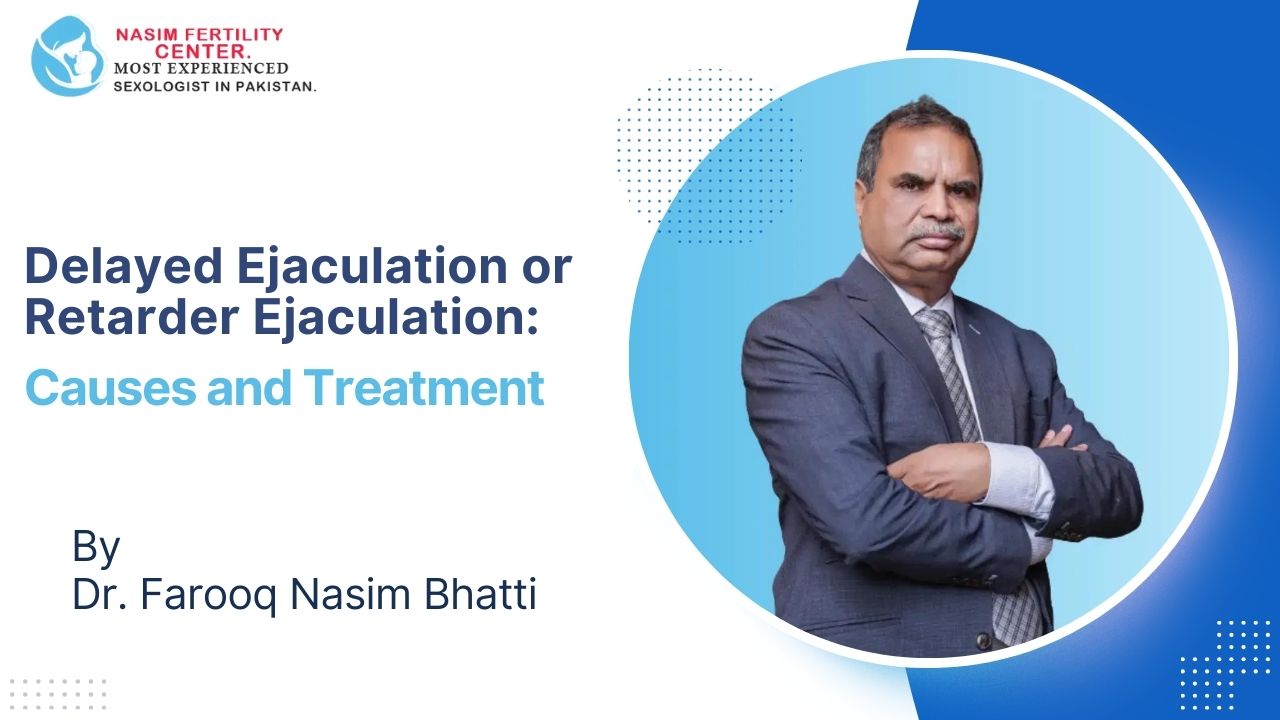
Delayed ejaculation (DE) is a sexual health condition that affects men around the world. Sometimes taking longer to ejaculate is normal. But when ejaculation is consistently very delayed or does not happen at all, and it starts affecting sexual life or relationships, medical help is needed.
At Nasim Fertility Center, Dr. Farooq Nasim Bhatti provides scientific, confidential, and personalized treatment for delayed ejaculation, based on over 31 years of clinical experience.
This article explains delayed ejaculation in simple English and also clarifies how it is different from premature ejaculation (Surat-e-Anzal)—even though in some cases both conditions can be connected at a psychological or brain-chemical level.
What is Delayed Ejaculation? An Overview
Delayed ejaculation (also called retarded ejaculation or male orgasmic disorder) is a condition in which a man cannot ejaculate easily, even with strong stimulation. In some cases, ejaculation happens only after a very long time. In other cases, it may not happen at all during intercourse.
It is important not to confuse this with premature ejaculation.
- Premature ejaculation = ejaculation happens too quickly
- Delayed ejaculation = ejaculation happens very late or not at all
Both conditions have different causes and treatments.
Who Is Affected by Delayed Ejaculation?
Delayed ejaculation can happen at any age, but it is more common in:
- Middle-aged and older men
- Men who experience the problem during sex with a partner, masturbation, or both
Because of this condition, men may experience:
- Frustration
- Low sexual satisfaction
- Relationship tension
Over time, this can negatively affect overall sexual well-being.
How Common is Delayed Ejaculation?
Delayed ejaculation is less common than other sexual dysfunctions like premature ejaculation or erectile dysfunction, but it still affects a significant number of men. Studies suggest that about 1-4% of men may experience this condition at some point in their lives. Its prevalence may be underestimated due to the stigma and reluctance of men to discuss such issues openly.
Taluq ke dauran ejaculation mein dair ho rahi hai?
Consult karein Dr. Farooq Nasim Bhatti – Pakistan ke top sexologist – jo delayed ejaculation ka confidential aur proven ilaj faraham karte hain.

Symptoms of Delayed Ejaculation
Common symptoms include:
- Not being able to ejaculate during intercourse
- Taking a very long time to ejaculate
- Reduced sexual pleasure
- Emotional stress or relationship problems
- Ejaculation happening only during masturbation, not with a partner
Causes of Delayed Ejaculation
Delayed ejaculation does not have one single cause. It usually happens due to a combination of psychological, medical, and lifestyle factors.
Psychological Causes
- Stress, anxiety, or depression
- Performance pressure
- Relationship problems or emotional distance
- Very strict religious or cultural beliefs where sex is seen as sinful
- Past sexual trauma or negative experiences
Important insight from Dr. Bhatti:
Just like premature ejaculation can develop from guilt and fear, delayed ejaculation can develop from Over-Control and Anxiety. In these cases, the brain does not “allow” ejaculation easily.
Physical and Medical Causes
- Diabetes
- Low testosterone
- Prostate problems or infections
- Neurological conditions (such as multiple sclerosis)
Medication Side Effects
Some medicines can slow or block ejaculation, including:
- Antidepressants
- Antipsychotics
- Blood pressure medicines
Lifestyle Factors
- Excessive alcohol or drug use
- Smoking
- Lack of physical activity
Age-Related Changes
As men age, sensitivity may reduce, which can delay orgasm and ejaculation.
Diagnosis of Delayed Ejaculation
Dr. Farooq Nasim Bhatti follows a step-by-step approach:
- Medical & Sexual History
- Masturbation habits
- Relationship factors
- Anxiety or guilt patterns
- Physical Examination
- Prostate check
- Neurological assessment
- Laboratory Tests
- Hormone levels (especially testosterone)
- Diabetes screening
- Psychological Evaluation
- Stress, anxiety, depression
- Sexual conditioning patterns
Doctors also check whether the patient previously had premature ejaculation that later turned into delayed ejaculation due to over-correction.
Treatment of Delayed Ejaculation
Treatment always depends on the main cause.
1. Psychological and Sex Therapy
- Reducing anxiety and performance pressure
- Addressing guilt-based beliefs
- Improving communication between partners
2. Medical Treatment
- Adjusting or changing medicines causing the problem
- Treating hormonal imbalance when needed
3. Behavioral Techniques
Patients are guided to:
- Become more aware of physical sensations
- Allow arousal naturally
- Reduce over-thinking during sexual activity
4. Lifestyle Changes
- Reduce or stop alcohol and smoking
- Regular physical activity
- Better sleep and stress management
Are There Exercises That Will Help with Delayed Ejaculation?
Yes, certain exercises can help:
- Kegel Exercises: Strengthening pelvic floor muscles can improve sexual function and control.
- There are some other exercises that can be prescribed by experienced sexologist by examining your medical history
Prevention
How Can I Prevent Delayed Ejaculation?
Preventing delayed ejaculation involves maintaining overall health:
- Healthy Lifestyle: Regular exercise, a balanced diet, and avoiding alcohol and drugs can reduce the risk.
- Mental Well-being: Managing stress and seeking therapy for anxiety or depression can prevent psychological causes.
- Open Communication: Discussing sexual issues with your partner can alleviate pressure and reduce performance anxiety.
- Manage chronic health conditions like diabetes and heart disease through lifestyle changes and medication adherence
- Make time for relaxation and stress-reduction activities
- Seek help early for mental health issues like depression, anxiety, and relationship problems
- Discuss medication side effects with your doctor and explore alternative options if needed
What is the Prognosis (Outlook) for Delayed Ejaculation?
The prognosis for delayed ejaculation varies depending on the cause. Many men respond well to treatment, especially when psychological factors are addressed. With proper medical care, lifestyle changes, and support, the condition can be managed effectively.
When Should I See My Healthcare Provider About Delayed Ejaculation?
If you experience persistent difficulty ejaculating, distressing symptoms, or if it impacts your relationship or quality of life, it’s essential to seek medical advice. Dr. Farooq Nasim Bhatti MBBS, FAACS (USA), Diplomate of the American board of Sexology (USA) since 1999, CST, HSC (Hong Kong), CART (MALAYSIA), CART (CHINA), can provide expert guidance and personalised treatment options.
Conclusion
Delayed ejaculation is a complex condition that can significantly affect a man’s life and relationships. However, with the right diagnosis and treatment plan, most men can find relief and improve their sexual health. Nasim Fertility Center, under the guidance of Dr. Farooq Nasim Bhatti, offers expert care and a comprehensive approach to managing this condition. Don’t hesitate to seek professional help if you or your partner are struggling with delayed ejaculation.
FAQs
Can delayed ejaculation be cured?
In many cases, delayed ejaculation can be successfully treated through a combination of medication, therapy, and behavioral techniques. However, the prognosis depends on the underlying cause. Lifelong or generalized DE may be more challenging to treat than acquired or situational DE.
Does masturbation affect delayed ejaculation?
Excessive masturbation with a specific technique or pornography use may contribute to delayed ejaculation by conditioning the man to respond only to certain types of stimulation. Temporarily avoiding masturbation or trying different techniques can help “reset” the man’s arousal patterns and improve partnered sexual function.
Is there a treatment to stop a man from ejaculating?
While delayed ejaculation treatment focuses on helping men climax more easily, certain conditions may require specific interventions to control premature ejaculation if that’s the issue.
How do you fix the inability to ejaculate?
Treatment involves addressing underlying physical, psychological, or lifestyle factors through therapy, medication adjustments, and exercises.
Why does it take so long for me to ejaculate?
Factors like conditioning of ejaculation to specific stimuli, stress, anxiety, certain medications, age-related changes, and medical conditions can prolong the time to ejaculation.
Can lifestyle changes help with delayed ejaculation?
Yes, adopting a healthy lifestyle, reducing alcohol intake, and quitting smoking can positively impact sexual function.
Disclaimer
This information is for educational purposes and not the treatment. For treatment, you need to consult the doctor.

Dr. Farooq Nasim Bhatti (MBBS, FAACS – USA, Diplomate: American Board of Sexology, CST, HSC – Hong Kong, CART – Malaysia & China) is a qualified medical sexologist with 30+ years of experience. He has presented 21+ research papers internationally and treats sexual dysfunction through sex therapy, counseling, and pharmacotherapy to restore natural sexual function without temporary medication.

Regain Confidence with Our ED Solutions
Explore effective treatments for erectile dysfunction. Take charge of your intimacy today.


